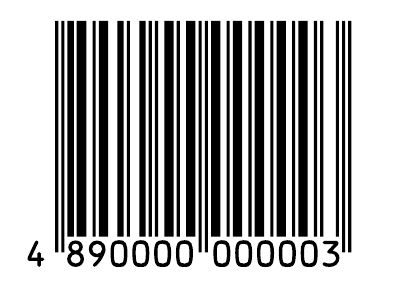Is it mandatory to become a GS1 member to use a legal barcode? - 成為GS1會員是否必須使用合法的條形碼?
To be quick, we will first answer the question: OF COURSE NOT!
And now, to be honest, we will explain it in detail.

GS1, the current name of the EAN International organization, was officially created on April 26, 1974 and opened its headquarters in Brussels, Belgium, not by chance the headquarters of the main European institutions.
GS1 is based on the EAN (European Article Number) system that uses (but can use other) barcode language to enter alphanumeric information into a computer automatically and error-free. Currently the EAN system is the one used throughout the world, implementing and replacing the original UPC USA, creator of the language.

GS1 has delegations in all countries, which are in charge of making members those who want to use a barcode. For example in Hong Kong we have GS1 Hong Kong.
Most of the GS1 delegations are private (non-governmental), voluntary and non-profit associations, which exempts them from paying taxes. But in reality they try to spread the idea that being associated is an obligation.
But there are several inconsistencies.
The first is that GS1 explicitly prohibits its associates from sharing numbers (bar codes) with others, that is, if I have a hundred bar codes and have only used two, I cannot give one to my brother.
Obviously, being a private (non-governmental), voluntary, non-profit association, I don't see how they would prevent you from doing it and I don't even see how they could find out about it; what I do see is an interest that anyone who wants to use a barcode (and the language is already in the public domain, not subject to rights) has to pay for life.
The second inconsistency is precisely this: pay annually and for life. Imagine that when we buy a car and they put the license plate on us, they tell us that we will have to pay the license plate every year of the life of the car. What reason is there to maintain an organization that only gives its associates an email, once in a lifetime?
The reality is that the local associations of GS1 have become, over the years, centers of big business, reaching the case in some countries with lax and monetized legality, in which they have registered the numbers as trademarks, and pursue judicially (they have a lot of money to hire the most expensive law firms) who goes astray.
Between countries they do not step on the business, of course, for that they use the country prefixes and the prohibition among them of associating any foreign company. GS1 Hong Kong can only support Hong Kong companies.
They have discovered the benefits of bringing relevant people from the business world to their boards of directors such as owners of large distribution companies, supermarkets, Amazon and others, with the goal in mind that each company compels its suppliers to pay GS1.
Well, once the interest of GS1 has been clarified, let's go to the most important thing: OUR INTERESTS.
The interest of an entrepreneur is to obtain an EAN barcode with official numbering, with the prefix of our country, 489, with the guarantee that it will not be duplicated or invented, at the lowest possible price and, of course, without having to repeat payment each year.
Obtaining it is easy, you just have to go to someone who has a bank of EAN numbers (GTIN) and is willing to sell them by units; It will also be necessary to make sure that it is a serious, local company, and with responsible people who can respond legally if something does not go as expected. It will also be necessary to demand a certificate of ownership that proves that we are the legitimate owners of the codes.
Some refer, with concern, to the data that appears in the internal database of GS1, Gepir. But the information that appears there is not 100% reliable, mainly due to the fact that members can request NOT TO APPEAR.
The basic rule of trade is that if I have something and I want to sell it, anyone can buy it if we agree on the price and the object being traded is not illegal.
Let's apply this basic rule to barcodes.
Do you need a barcode?